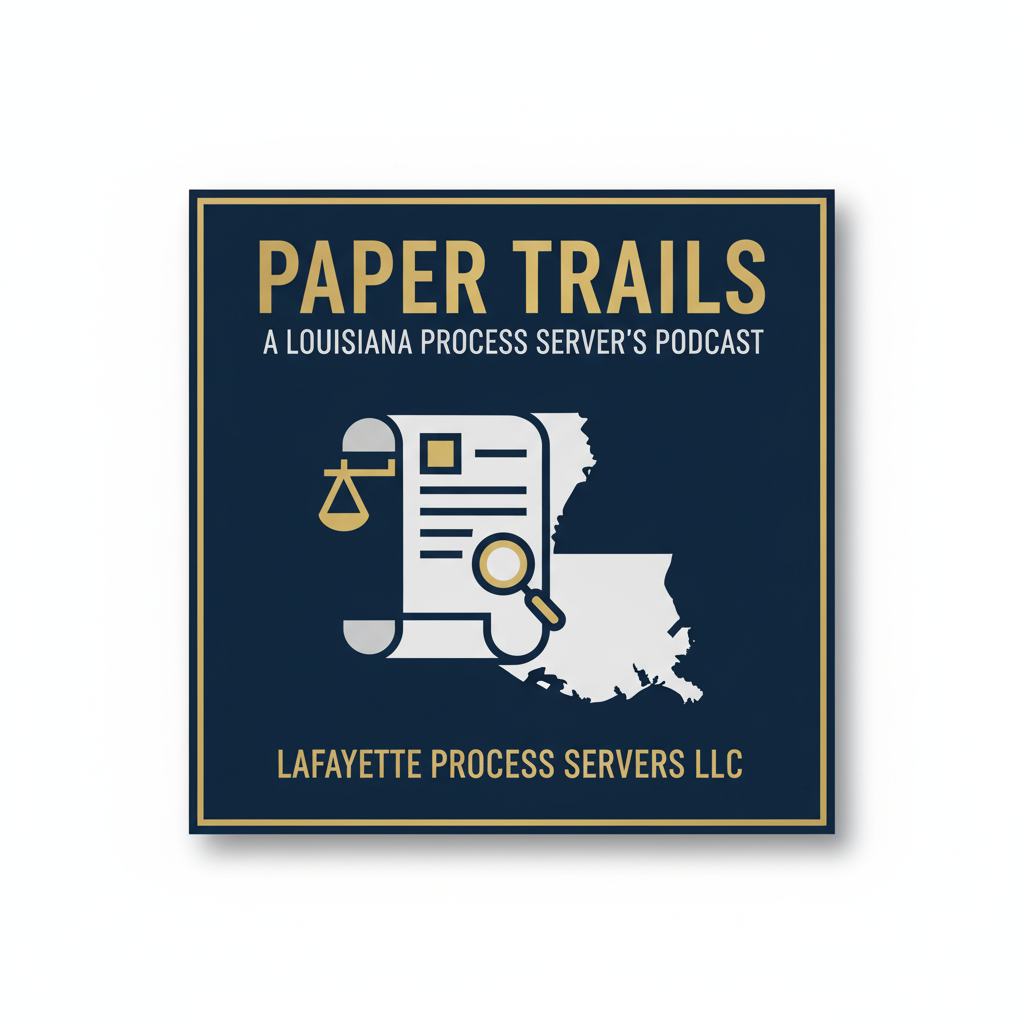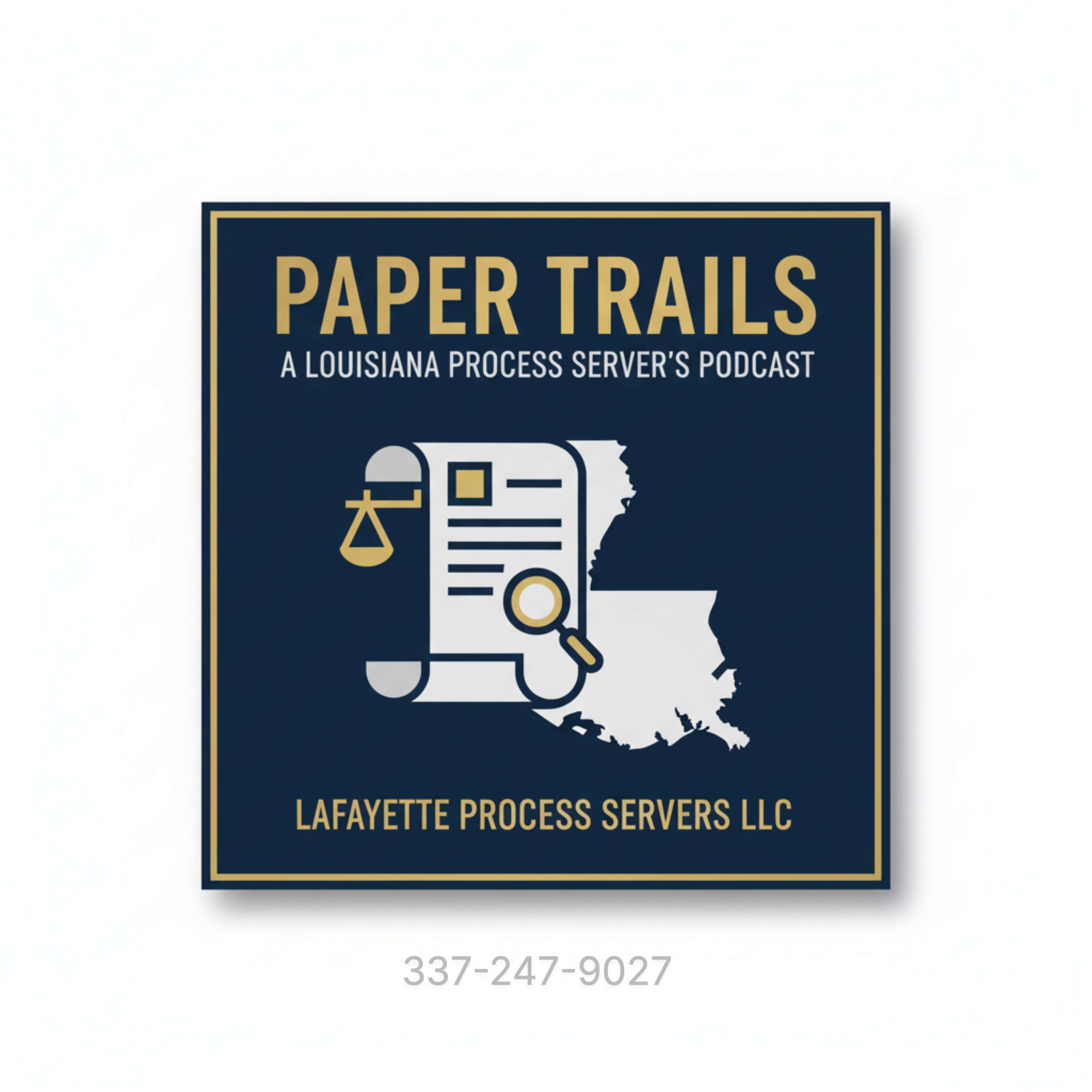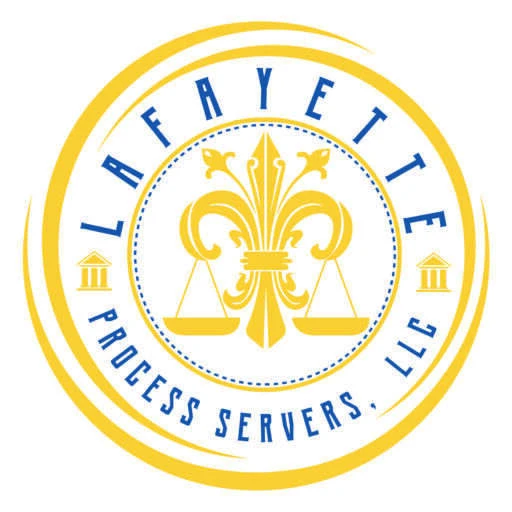Episode Transcript
[00:00:00] Speaker A: Imagine this.
You are locked into a legal situation.
You have all your evidence ready, but the case is just stuck. It's in neutral.
[00:00:09] Speaker B: Right.
[00:00:10] Speaker A: Because the other party, the defendant, they've seemingly mastered, like, the art of legal invisibility.
[00:00:16] Speaker B: Yeah. They know the documents are coming. They've screened their phone calls.
[00:00:19] Speaker A: They ignored the door.
[00:00:21] Speaker B: Exactly. Ignored the door. And they're just delaying everything. It's the ultimate choke point in the legal system. Really.
[00:00:28] Speaker A: It really is.
[00:00:28] Speaker B: When a defendant successfully evades service, they're basically hijacking the timeline. They're exploiting that requirement that everyone has to be officially notified before things can move forward.
[00:00:39] Speaker A: That's right. So today we are taking a deep dive into this highly specialized, pretty strategic world of the difficult serve. Our focus is on the professional tactics used by process servers, specifically operating under the standards of Louisiana law, to overcome an evasive defendant.
[00:00:57] Speaker B: Right. And get those papers delivered ethically.
[00:01:00] Speaker A: Yeah.
[00:01:00] Speaker B: Legally.
[00:01:01] Speaker A: Our source material is essentially, well, it's like a professional's playbook. It outlines that shift from just routine delivery attempts to strategic investigation.
[00:01:12] Speaker B: Yeah. And our mission here is to unpack these ethical sort of high level professional maneuvers so you can understand the specialized knowledge it takes. It's really about finding that balance between.
[00:01:23] Speaker A: Personal persistence and sticking to the law.
[00:01:25] Speaker B: And absolute adherence to the law. Exactly.
[00:01:28] Speaker A: Okay, let's dig into this then. If you are a process server and you've tried the standard attempts maybe three or four times, different times a day, and failed, how do you pivot? How do you know you're dealing with someone who is truly evasive versus, I don't know, someone who just works really erratic hours?
[00:01:45] Speaker B: That is the essential pivot point. Once the regular schedule, the standard attempts fail, the server shifts mindset, they move into an investigative mode.
[00:01:54] Speaker A: Okay.
[00:01:54] Speaker B: And they begin looking for specific behavioral indicators, you know, the telltale signs that this is an active effort to avoid service, to avoid justice.
[00:02:02] Speaker A: Really give us the profile. What are they trained to look for? What are those signs?
[00:02:06] Speaker B: Okay, well, the first big sign is just refusal to answer the door when they are obviously home.
[00:02:12] Speaker A: Obvious how?
[00:02:13] Speaker B: We're talking clear signs, lights on inside. There's specific car parked right there in the driveway. Maybe you even hear a TV or music.
[00:02:22] Speaker A: Ah, okay.
[00:02:22] Speaker B: Yet the door just stays stubbornly closed. They are physically present, but they're refusing to engage with reality.
[00:02:29] Speaker A: You know, so it's not just that they are out, it's that they are in and actively choosing silence.
[00:02:34] Speaker B: Precisely. Then the second major indicator is coordination.
[00:02:38] Speaker A: Coordination?
[00:02:39] Speaker B: Yeah, like family members, roommates, anyone else answering the door consistently Claims the person is not home always, regardless of the time or day.
This kind of coordinated story, it suggests the defendant has actually coached those around them, given them the evasion script.
[00:02:54] Speaker A: That's fascinating. It really points to a level of premeditation, doesn't it?
[00:02:57] Speaker B: Absolutely. Third, they look for a sudden, maybe suspicious change in established routines. Well, say the server's initial observations suggested the defendant always left for work around 8. 00am suddenly they're leaving at 6:30am one day, maybe 10. 00am the next.
That abrupt shift suggests they've probably spotted the server. Or they suspect service is imminent and they're altering their patterns to minimize the risk of being caught.
[00:03:23] Speaker A: Right. Trying to throw them off.
[00:03:24] Speaker B: And finally, a big one. They stop answering any communication from unknown numbers or voices, phone calls, maybe even intercoms. It's a key sign they're on high alert.
[00:03:34] Speaker A: Okay, so once that profile seems likely, just knocking again and again. What? Well, that's probably not going to cut it. No, this moves us out of simple delivery and into real strategy.
The first core tactic professionals use is patience and observation.
The stakeout.
[00:03:49] Speaker B: Right, right. But when people hear stakeout, they often think, you know, surveillance vans, big binoculars, huge expense.
[00:03:55] Speaker A: Yeah, like the movies.
[00:03:56] Speaker B: It's not really like that in this field. It's usually highly precise and targeted. It involves discreetly observing a property from a distance. And I stress discreetly to map out a genuine unforced pattern of life.
[00:04:08] Speaker A: But I have to ask, you know, for a client who's maybe paying hourly, doesn't a stakeout quickly become really cost prohibitive? Wouldn't it just be better to keep trying random times, more attempts?
[00:04:20] Speaker B: That's a critical question. A financial one. But professionals tend to view it as an investment in efficiency.
[00:04:26] Speaker A: How so?
[00:04:27] Speaker B: Look, continuous random attempts can burn a lot of hours and often yield pretty low success rates against someone determined to evade. But maybe a 90 minute period of focused observation where the server maps out, say, exactly when the defendant walks the dog or checks the mail or takes out the recycling bin. That can pinpoint a tiny, maybe 60 second window of maximum accessibility.
[00:04:50] Speaker A: Ah, I see.
[00:04:51] Speaker B: It can actually save dozens of failed trips. In the long run. The goal is getting actionable information which minimizes those wasted trips and hours.
[00:04:59] Speaker A: That reframes it nicely. It's data collection, not just waiting around. Okay, so once you have that data, you know the defendant is probably expecting you, or at least wary. You need to reset the clock, regain control somehow. That brings us to the second tactic. The element of surprise.
[00:05:14] Speaker B: Yes.
If the defendant has seen you before, or suspects you're coming. They are now likely timing their schedule around your known attempts. They expect the server maybe between 9am and 5pm, Monday to Friday.
[00:05:28] Speaker A: Usual business hours.
[00:05:29] Speaker B: Exactly. So to introduce that element of surprise, you have to operate outside that expected window, be unpredictable.
[00:05:37] Speaker A: How far outside the window are we talking?
[00:05:39] Speaker B: Are there limits as far as legally permissible within Louisiana law? Of course. But yeah, the professional server will vary their attempts significantly. This means showing up very early in the morning, sometimes before 7am, maybe even earlier if allowed, before the person is really mentally prepared to deal with the.
[00:05:57] Speaker A: Day, catch them off guard.
[00:05:58] Speaker B: Or conversely, showing up late in the evenings, maybe eights 00:00pm 09:00pm when they've settled in, maybe relaxed a bit and their vigilance might have dropped.
[00:06:07] Speaker A: Makes sense.
[00:06:08] Speaker B: And weekends are also key. A lot of defendants assume legal business only happens Monday through Friday. Serving on a Saturday or Sunday can be very effective.
[00:06:16] Speaker A: So you're really capitalizing on their psychological guard, being down at those odd times. But sometimes the physical location itself is the main problem. Maybe it's a gated community, super secure. Or the defendant works from home and has like a fortress setup.
[00:06:31] Speaker B: Right.
[00:06:31] Speaker A: When home service repeatedly fails, the sources point to tactic three, the workplace serve.
[00:06:37] Speaker B: Yeah, the workplace is often the most reliable alternative location.
Why? Because unlike being home, showing up for work is usually a non negotiable requirement of their life.
[00:06:48] Speaker A: They have to be there.
[00:06:48] Speaker B: They generally have to be there. Now, when executing this, especially in Louisiana, the server is often trying to serve the individual personally. But sometimes the law allows service on someone else there someone in charge.
[00:06:59] Speaker A: Now that brings us to the the technical specifics of the law. How does the Louisiana code specifically inform this workplace tactic? Is it different from other places?
[00:07:09] Speaker B: Well, this is where the legal constraints actually become strategic tools. Under the Louisiana Code of Civil Procedure, service can sometimes be made upon a person who is apparently in charge of the business premises at the time of service.
[00:07:21] Speaker A: Apparently in charge?
[00:07:22] Speaker B: Yeah. Or sometimes a designated registered agent, provided the circumstances meet strict legal criteria. This option makes the workplace highly attractive because the server might have multiple potential potential points of legal entry for service, even if the defendant themselves is hiding in an office somewhere.
[00:07:38] Speaker A: But this sounds like it needs to be done with extreme care. You can't just barge in and disrupt their employer or cause a huge scene.
[00:07:45] Speaker B: Oh, absolutely not. Discretion is paramount. The server isn't there to shame the person or disrupt the business.
[00:07:51] Speaker A: Right.
[00:07:52] Speaker B: They are there purely to identify the target, quietly present the documents, state what they are, and conclude the service efficiently causing a commotion is totally unprofessional.
[00:08:02] Speaker A: You could backfire legally.
[00:08:04] Speaker B: Exactly. Could lead to issues with trespass, maybe even harassment claims. It must be efficient, quiet, and legally conclusive. That's the goal.
[00:08:14] Speaker A: Okay, so that covers home and work. What about the final major tactic? What happens if the defendant has truly vanished? Maybe moved residences entirely, maybe gone off grid, and all the initial addresses have failed? Tactic four, advanced skip tracing.
[00:08:29] Speaker B: Yes, and we should probably clarify the jargon first. Skip tracing is simply the process of locating a skip.
[00:08:36] Speaker A: A skip?
[00:08:37] Speaker B: Yeah, it's just industry slang for a person who has disappeared or moved without leaving a known forwarding address. They've skipped town.
[00:08:43] Speaker A: Got it.
[00:08:44] Speaker B: Now, the professionals, they don't just use Google or basic public record searches like you or I might. They use advanced tools, specialized databases.
[00:08:54] Speaker A: So why does the professional database work where, you know, the average person searching online might fail? What kind of information is actually in there?
[00:09:02] Speaker B: It's really about proprietary data linkage. It's how the data is connected. Professional databases aggregate information from specialized, often non public, sources.
[00:09:11] Speaker A: Like what?
[00:09:12] Speaker B: Think utility hookups, new phone activations, professional licenses, sometimes specialized insurance applications, or even, like, new business registrations or associations. Things not easily accessible through a standard public search.
These tools link names, addresses, phone numbers, known associates, property records across multiple vectors, sometimes in real time or near real time.
[00:09:34] Speaker A: Wow. So if the defendant opened a new utility account in a different parish or registered a business license in a new town, Advanced skip tracing tools are designed to find that connection. It turns a dead end search into verified intelligence on a current physical address.
[00:09:50] Speaker B: That really moves the process from being like glorified detective work into something closer to data science. You're mapping their digital and physical footprint simultaneously.
[00:10:00] Speaker A: Absolutely. And the goal is to ensure that the documents are ultimately delivered to the correct current location, minimizing the risk of having the service challenged and invalidated later on.
[00:10:11] Speaker B: Okay, this is where, as they say, the rubber meets the road. While all these tactics sound, you know, aggressive and strategic, they absolutely must be executed within exceptionally tight legal and ethical boundaries. Yes, they are professionals, which means they know exactly what they cannot do, just as much as what they can.
[00:10:29] Speaker A: And this adherence to the line, it isn't optional. It's actually a strategic necessity for them.
[00:10:34] Speaker B: Why? Because if the process server uses improper means, trespasses, impersonates, someone, uses threats, the defendant can immediately file what's called a motion to quash service.
[00:10:46] Speaker A: Which does what?
[00:10:47] Speaker B: It essentially tells the court, hey, I was never legally notified. According to the rules, if the judge agrees, it throws the service out. The server has to start all over again.
[00:10:55] Speaker A: And the defendant wins the delay game.
[00:10:57] Speaker B: Exactly. The defendant successfully delayed justice. So knowing that never list what you absolutely cannot do is the strategic foundation of the entire job.
[00:11:07] Speaker A: Let's detail that. What are the absolute lines process servers are trained never to cross? Specifically based on our sources.
[00:11:14] Speaker B: Okay. Top of the list. Never ever impersonate a police officer, federal agent, or any kind of government official. That's illegal carries severe penalties.
[00:11:22] Speaker A: Right.
[00:11:23] Speaker B: Second, they cannot trespass. Now, this can be a bit tricky. While they can often approach a front door or maybe walk up a driveway if it's unlocked and clearly inviting visibility.
[00:11:32] Speaker A: Like for mail or deliveries.
[00:11:34] Speaker B: Right. But they absolutely cannot climb over a locked gate, force open a door, enter a garage, or walk into a private home without explicit permission.
[00:11:42] Speaker A: So no jumping offense to shove the papers at the person hiding in the backyard.
[00:11:47] Speaker B: The definitely not. Correct. Furthermore, they are strictly prohibited from using threats, coercion, or any kind of intimidation to secure service.
[00:11:55] Speaker A: No strong arming.
[00:11:56] Speaker B: No. And they also can't improperly access private property like mailboxes. That's a federal offense anyway. Every single method they employ must strictly comply with state law.
[00:12:07] Speaker A: Which in this case means the very detailed rules set out in the Louisiana Code of civil procedure, Article 1231 and onwards.
[00:12:15] Speaker B: Precisely. Those articles lay out exactly how service must be performed.
[00:12:19] Speaker A: And beyond just the state law, they often subscribe to an even higher standard of conduct. Correct. Through professional groups.
[00:12:25] Speaker B: That's right. Many reputable process servers and agencies adhere to the standards set by organizations like the national association of Professional Process Servers.
They have their own code of ethics. That combination of state law and professional ethics helps ensure that the service is not just effective in getting the papers delivered, but also legally unimpeachable if challenged later.
[00:12:46] Speaker A: So what does this all boil down to for you, the listener who might be navigating a legal situation, or just curious about this corner of the system, synthesizing all this knowledge, serving an evasive defendant, it really seems like an art form. It requires patience, yes, but also high level strategy, powerful investigative tools like advanced.
[00:13:07] Speaker B: Skip tracing, and crucially, that unwavering adherence to the ethical and legal boundaries we just talked about.
[00:13:13] Speaker A: Yeah, the big takeaway here, perhaps, is that the expertise of a professional process server is what prevents the defendant's main tactic, which is usually just delay, from succeeding.
[00:13:24] Speaker B: Their job is timely, precise legal execution. It ensures the wheels of justice can actually start turning and the case moves forward as it should.
[00:13:32] Speaker A: And as always, we need to stress the information we provide here is general. It's for understanding any specific legal situation. You might face. Absolutely. Requires consultation with a qualified attorney licensed in your jurisdiction.
[00:13:45] Speaker B: Definitely.
[00:13:47] Speaker A: But knowing what we know now, consider this sort of final, provocative thought.
We've seen how Louisiana's specific, pretty strict code of civil procedure requires immense precision.
It prevents servers from cutting corners like, say, trespassing or using intimidation.
[00:14:02] Speaker B: Right. The rules are tight.
[00:14:04] Speaker A: So does this ultra strict legal framework, by raising the bar so high for acceptable tactics, does it actually end up creating better, more meticulous and ultimately more ethical investigators?
Because failure due to a legal misstep is simply not an option for them. Their work gets thrown out.
[00:14:21] Speaker B: That's a fascinating point. It arguably forces creativity within constraints, and often that's where the most effective and legally sound solutions are found. You can't just break the rules. You have to outthink the situation within the rules.
[00:14:32] Speaker A: Right. Well, we've covered the four core strategies, observation, surprise, the workplace, skip tracing, and the ironclad ethics that govern this really challenging and essential corner of the legal world.
[00:14:44] Speaker B: It's a complex job for sure. Thanks for joining us for this deep dive today.


